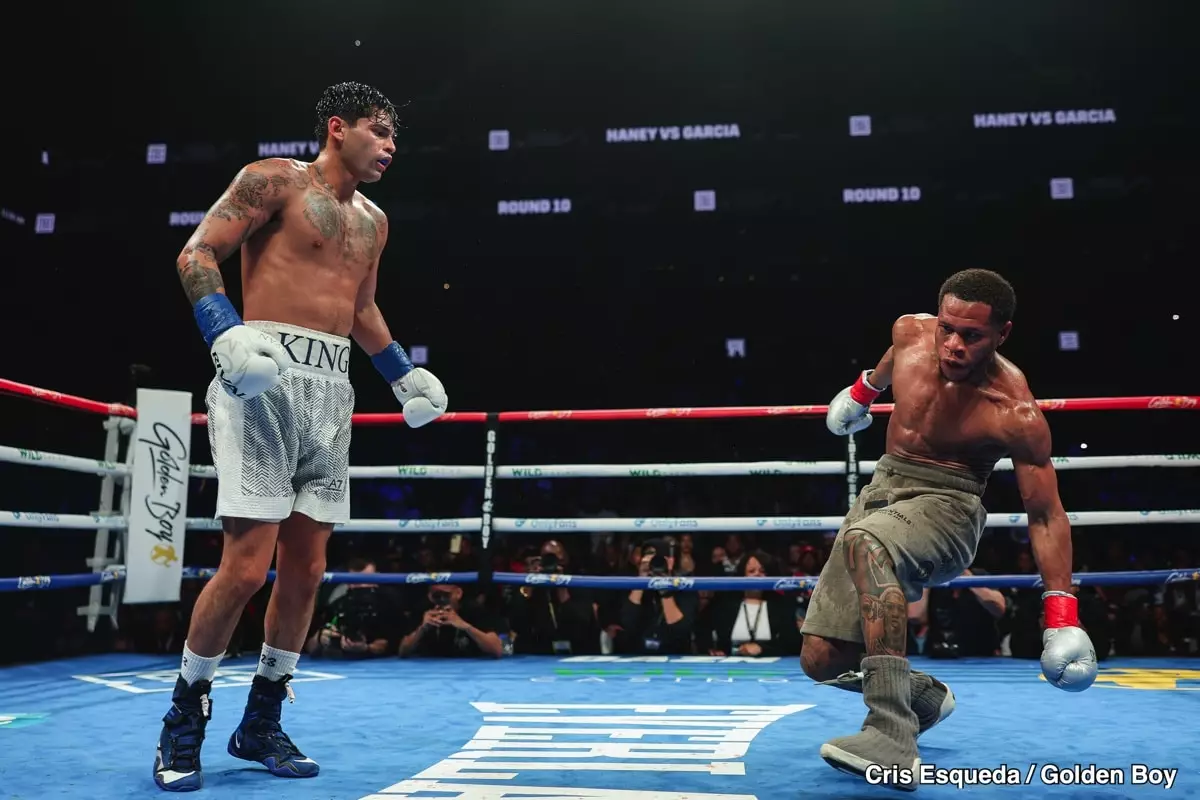Boxing, a sport rich in drama and rivalry, often serves as a mirror reflecting the strengths and weaknesses of those involved, both in and out of the ring. A current example is the fallout between Devin Haney and Ryan Garcia, a saga constructed not only around punches thrown but also around lawsuits filed and reputations challenged. Oscar De La Hoya, a seasoned promoter and former champion himself, has cast significant doubt on the prospects of a rematch between the two fighters, harboring concerns not just about Haney’s physical condition but also his mental readiness to combat future challenges.
Oscar De La Hoya’s unfiltered comments about Devin Haney, which label him as a “shot fighter,” are indicative of a broader sentiment within the boxing community. Following Haney’s defeat to Garcia in April, observers noted a stark decline in Haney’s performance. The repeated knockdowns he suffered during the fight, coupled with his subdued response in its aftermath, has led fans and analysts to question the former champion’s viability as a top-tier contender in this sport. This is a critical point, as an athlete’s psychological state can dramatically impact their performance. The lingering question remains: has Haney’s confidence been irreparably damaged?
In a perplexing twist, Haney has opted to sue Garcia for battery, fraud, and unjust enrichment, decision-making that has left many scratching their heads. Critics argue that launching a lawsuit only serves to undermine Haney’s credibility and intention of seeking a rematch. Such actions could depict a fighter who is grasping at straws, potentially reflecting desperation rather than strategy. It might suggest that Haney’s confidence is so shaken that he’s unwilling to return to the ring and confront Garcia again, choosing instead a path that seems more like retreat than recovery.
Notably, this decision raises questions about who is truly behind the legal strategy. The implications of litigation extend beyond personal grievances; they can often overshadow career trajectories, especially for boxers where public perception is crucial. The advice or influence of Bill Haney, Devin’s father, may play a role, but the ultimate responsibility lies with the athlete. Regardless, this decision highlights a troubling aspect of modern sports—it has become increasingly common for athletes to resort to the courts instead of the canvas.
Oscar De La Hoya further commented on the implications of Haney’s lawsuit, characterizing it as “noise” that distracts from the more pressing needs of Garcia’s career. His vision for Ryan seems resolute. De La Hoya emphasizes a return to the gym and a focus on personal growth—a critical narrative for any athlete seeking redemption after a setback. His comments convey a dual strategy: restoring Garcia’s fighting spirit while simultaneously dismissing any weight the lawsuit may have.
However, one cannot ignore the irony in De La Hoya’s statements, especially when he recalls his own illustrious career. By highlighting the different approaches he would have taken—direct action in the ring, rather than resorting to litigation—De La Hoya inadvertently raises the stakes for Haney. The approach one takes in the face of adversity often determines their legacy in the sport.
Despite the complications surrounding Haney’s situation, the idea of a rematch with Garcia was initially seen as a potential cash cow for both fighters. Nonetheless, De La Hoya’s assertion that “that ship has sailed” leaves little room for optimism regarding a return to the ring for Haney against his rival. Money and financial motivation are undeniable factors in boxing, but they cannot substitute for lost confidence and diminished skills.
Garcia’s prospects, on the other hand, appear brighter, as he seems motivated to focus on his career’s trajectory. De La Hoya’s encouragement and shared experiences might serve to bolster Garcia’s resolve, leading him toward future opportunities in the sport.
In this intricate dance between fighters, promoters, and legal representatives, both Devin Haney and Ryan Garcia find themselves at pivotal junctures in their careers. Haney’s current path raises questions about recovery, mental fortitude, and the legacy of a fighter who may be more focused on courtroom battles than boxing wars. Conversely, Ryan Garcia’s journey seems set to regain momentum with the right guidance and determination.
Ultimately, both men must navigate the complexities of defeat, expectation, and the ever-looming specter of their previous encounters. With the boxing world watching, their next moves will not merely define their careers, but will also serve as critical narratives in the storied history of the sport.

